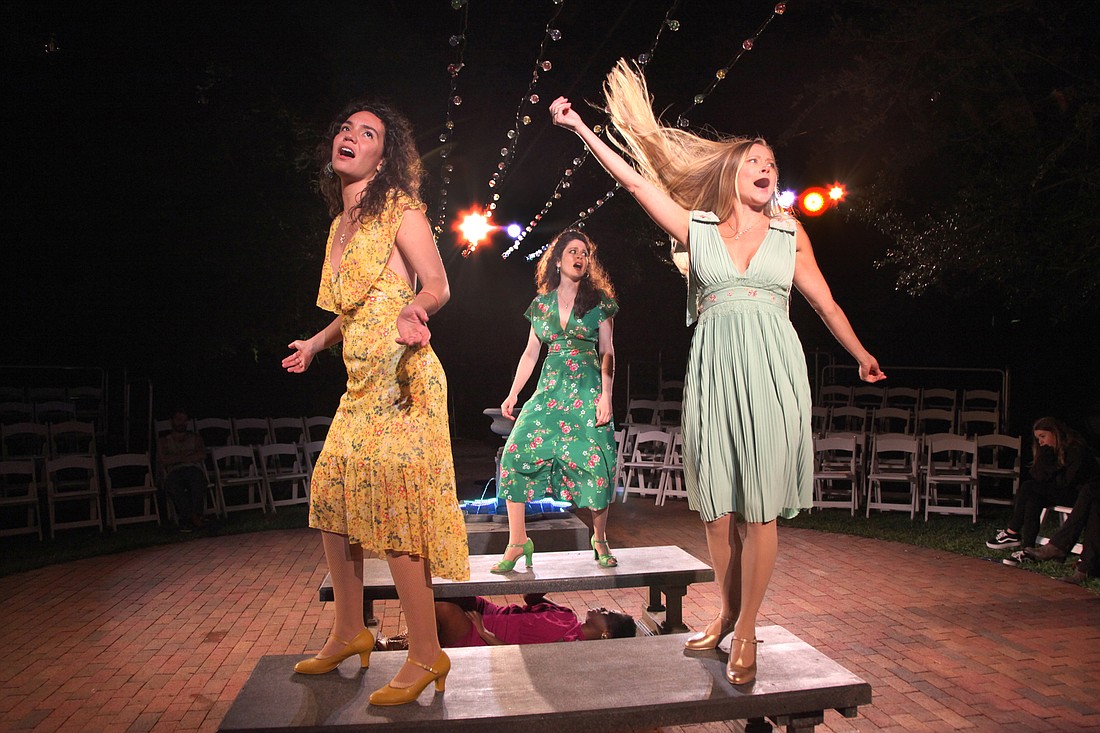- April 19, 2024
-
-
Loading

Loading

Shakespeare’s “Much Ado About Nothing” is always a breath of fresh air. In the FSU/Asolo Conservatory for Actor Training’s latest production, that’s literally true. The troupe substitutes Selby Gardens for Sicily and performs under the stars. As to the play itself …
Don’t be fooled by its self-deprecating title. “Seinfeld” was famously a show about nothing. “Much Ado” is definitely about something. There’s a point to the whole affair. To modern minds, it’s a surprising point. But here it is …
The power of manipulation can be used for good or evil. Shakespeare’s early comedy reveals both sides of that equation.
The play begins with a con game in the service of love. (Or potential love.) Benedick (Dylan Crow) and Beatrice (DeAnna Wright) are the potential lovers in question. They seem like haters at first. Whenever they meet, they fight. But instead of crossing swords, they slash with razor-sharp wits. Their verbal sparring is hilarious. But it fools nobody — apart from Beatrice and Benedick. Their aristocratic friends all assume they secretly burn for each other. (As Freud should’ve said, “You always pretend to hate the love you hide.”) So, in a classic rom-com plot (which Shakespeare probably invented), their noble pals trick each one into thinking the other’s secretly in love with them. This saintly scam works like a charm. After a few complications, Benedick’s friend, Count Claudio (Scott Shomaker), also proposes to Hero (Katie Sah) Beatrice’s cousin. Hero says “yes,” and her father consents. The wedding is on! A happy ending seems near. But don’t forget the dark side …
Don Juan (Matt Kresch) is our man in the evil corner. He’s an illegitimate half-brother to Dona Petra (Olivia Osol) — a classic melodramatic villain, complete with handlebar moustache, a penchant for fisticuffs, and an all-black wardrobe. This lovey-dovey crap sets Don’s teeth on edge and his mind to scheming. In an old silent movie, he’d tie Hero to the nearest train tracks. As this is an Elizabethan play, our low-rent Iago decides to spoil the upcoming wedding. With the help of a henchman, he frames Hero. (The fools all think she had a one-night stand, nyah-ha-ha!) Needless to say, it’s a bad day for a white wedding. Claudio publicly shames Hero at the altar; she collapses, and it just gets worse. Benedick and Beatrice struggle to clear Hero’s name. Until they can, they hide Hero and pretend she died of a broken heart. Even more complications ensue. As this is a Shakespearean comedy and not “The Game of Thrones,” the happy ending eventually arrives. Along with, yes, a wedding.
Apart from a lack of cross-dressing, the comic nonsense transpires with the Bard’s usual bits of business. Director Jonathan Epstein spices it up with a mix of creative anachronism, gender-bending, and slapstick. He subverts the play’s patriarchal society, and turns the conquering hero into a woman. (Don Pedro becomes Dona Petra.) He also puts Benedick in drag at the costume ball.
Speaking of costumes, Sofia Gonzalez outfits the cast in ruffled finery worthy of Sergeant Pepper’s Lonely Hearts Club Band. Apart from Selby Gardens itself, the set is pretty much a fountain. If you figure somebody’s going to get wet, you figured right. (As Anton Chekhov should’ve said, “A shotgun over the mantelpiece will be fired. A fountain will be stepped in.”) Kudos also to Eliza Ladd (for authentic period dance and fight moves) and Chris McVicker (for the otherworldly lighting.)
The third-year student actors hit it out of the park. (Or, in this case, garden.) Here are just a few highlights from the large-cast production:
Wright delivers a fresh, spirited take on Beatrice. The character’s usually portrayed as concealing a vulnerable inner heart with a tough outer shell. Wright’s Beatrice has heart, but her toughness isn’t a put-on. Beatrice gets most of the play’s best lines, and the actor makes the most of it. (Wright is stellar in the “Oh, if only I were a man” speech.) Crow’s Benedick is no fool, though it’d be easy to play him that way. Crow portrays him as a warrior out of his element. His Benedick is unsurpassed on the battlefield, but lousy at small talk. Crow’s performance reminds me of Danny Kaye at his best. He never tries to be funny, and that’s what makes him funny.
Erik Meixelsperger’s guitar-picking Sheriff Dogberry is a rustic redneck lawman. He’s gentle to his suspects but brutal to the English language. Kresch’s Don Juan is gleefully, unapologetically rotten. How’d he get so bad? (Ask not. He’s a villain. Villains do villainous things. There’s your motivation right there.) John Wilson Bennett is dully loyal as Don Juan’s henchman. (The poor guy’s not smart enough to be truly evil.) Osol’s Dona Petra is a cool, unflappable authority figure. Katie Sah’s Hero gets to melt in a puddle of sorrow and magically reconstitutes herself. Scott Shoemaker’s Claudio is tricked into treating her like dirt; then wises up and marries her. (I’m sure Hero will never bring it up.)
Shakespeare’s romp through the garden of good and evil takes many surprising turns. The play’s an odd mix of bawdy Elizabethan puns and Christian symbolism. (Hero must “die to live,” being the most obvious.)
An outdoor performance can be magical, but it’s always a roll of the dice. A theater auditorium is an artificial space devoted to make-believe. When a play unfolds in the real world, some part of your brain thinks it’s “real.” But reality has a way of intruding. Aside from a dithering helicopter, reality held its peace on the night I saw the play.
The magic worked. And that’s something.